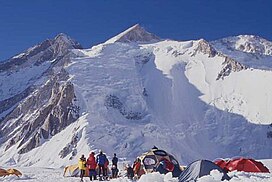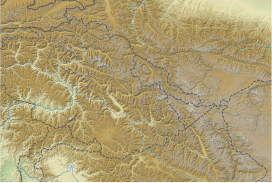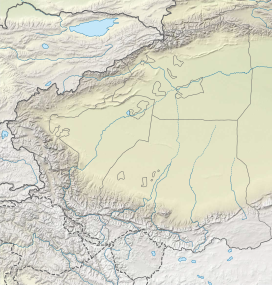Gasherbrum II (Balti: རྒ་ཥཱ་བྲུམ་། - ༢, romanized: rgasha brum 2, lit. 'Beautiful Mountain 2'; Urdu: گاشر برم - ۲; simplified Chinese: 加舒尔布鲁木II峰; traditional Chinese: 加舒爾布魯木II峰; pinyin: Jiāshūěrbùlǔmù II Fēng); surveyed as K4, is the 13th highest mountain in the world at 8,035 metres (26,362 ft) above sea level. It is the third-highest peak of the Gasherbrum massif, and is located in the Karakoram, on the border between Gilgit–Baltistan, Pakistan and Xinjiang, China. The mountain was first climbed on July 7, 1956, by an Austrian expedition which included Fritz Moravec, Josef Larch, and Hans Willenpart.
Geography
Gasherbrum II is located on the border of Gilgit–Baltistan, Pakistan, and Xinjiang, China. It is part of the Karakoram mountain range in the Himalayas, and located at the top of the Baltoro Glacier. With an elevation of 8,034 metres (26,358 ft) it is the third-highest member of the Gasherbrum group, behind Gasherbrum I (8,080 metres or 26,510 feet) and Broad Peak (8,051 metres or 26,414 feet). Gasherbrum III is sometimes considered to be a subpeak of Gasherbrum II, because the former has a topographic prominence of only 461 metres (1,512 ft).
Naming
In 1856, Thomas George Montgomerie, a member of the British Royal Engineers and part of the Great Trigonometric Survey, sighted the mountain and named it "K4", meaning the fourth mountain of Karakoram. The name "Gasherbrum" comes from the Balti words rgasha ("beautiful") and brum ("mountain"). Contrary to popular belief, it does not mean "shining wall", which is how Sir William Martin Conway described nearby Gasherbrum IV on an 1892 exploration.
Climbing history
The mountains of the Gasherbrum group were explored in 1909 by the Duke of the Abruzzi and Vittorio Sella. The Abruzzi Glacier, a tributary of the Baltoro Glacier, is named after the Duke.
In 1934, Günter Dyhrenfurth and his International Himalayan Expedition, including André Roch, explored Gasherbrum I and II, making it 6,250 metres (20,510 ft) up Gasherbrum II.
The first ascent came on July 7, 1956, by Austrians Fritz Moravec, Josef Larch and Hans Willenpart by the Southwest Ridge. After they set up Camp I, they had to descend, and found the camp—and all their supplies and food—buried by an avalanche when they returned. Despite this, they decided to make a quick summit attempt. After opening up a route, they left Camp III on July 6. The group spent the night in a bivouac sack and reached the top at 11:30 am the next day.
1970s
In 1975, four expeditions successfully climbed Gasherbrum II, including Jean-Pierre Fresafond's French expedition, a Polish group under Janusz Onyszkiewicz, and another Polish expedition led by Wanda Rutkiewicz.
Four years later, a Chilean group claimed to have used the "normal" route to reach the top. Several others, including Reinhard Karl, Hanns Schell, and Kurt Diemberger also reached the summit.
1980s
Swiss Mountaineers Romolo Nottaris and Tiziano Zünd were the first to reach the summit in alpine style on August 3, 1981.
On July 24, 1982, Reinhold Messner, along with Nazir Sabir and Sher Khan, climbed the peak via the Southwest Ridge. During the ascent, Messner discovered the body of a previously missing Austrian mountaineer, whom he buried two years later at the G I – G II crossing. He wrote of his climb of Gasherbrum II in the book 3 x 8000: My Great Year in the Himalaya (German: 3 x 8000: Mein grosses Himalaja-Jahr).
In July 1984, Reinhold Messner and Hans Kammerlander reached both Gasherbrum II and Gasherbrum I without returning to base camp, in alpine style.
In August 1984, a French expedition led by Daniel Croisot, reached the summit and achieved the integral first descent by ski of Gasherbrum II, as witnessed and joined by Dominique Dock who was medical officer for the expedition. Patrice Bournat and Wim Pasquier skied the sowthwest ridge to Base Camp from 7,500 meters.
In August 1986, Gasherbrum II was successfully ascended by a Slovene expedition in only 32 hours from the base to the peak, with only 22 hours of climbing and 10 hours of rest at the altitude of 5900 m. This was by far the fastest ascent until then.
1990s
In July 1996, Jean-Christophe Lafaille climbed Gasherbrum I and II in four days, without stopping at Base Camp in between.
In 1997 Anatoli Boukreev achieved a solo speed ascent, camp ABC (5800 metres) to summit in 9 hours 30 min.
2000s
In 2006, Sebastian Haag and Benedikt Böhm climbed Gasherbrum II twice within a week. At 8:00 am on July 29, they reached the top and then skied down without abseiling or removing their skis. They rested for a few days before leaving Camp I again on August 3. They started out fast, reaching Camp IV in six hours, but 50 centimetres (20 in) of fresh snow slowed them down, and they reached the summit after over six hours of tough climbing. They descended on skis again, this time made even more dangerous by packed-down snow and the risk of avalanche. Despite this, they both made it safely back to Camp I in under 17 hours, whereas a normal expedition takes four to seven days.
Karl Unterkircher and Daniele Bernasconi, two Italians, climbed Gasherbrum II in 2007 in alpine style. They were the first to use the North Face through China. The route had been attempted a year earlier by a German–Swiss team, but they abandoned it after an avalanche. During the attempt they fixed around 1,200 metres (3,900 ft) of rope. They arrived at the summit around 8:00 pm on July 20, after spending the night in a bivouac shelter. A third member, Michele Compagnoni, grandson of Achille Compagnoni, turned back just 150 metres (490 ft) before the summit. The team reunited and descended down the normal, northwest route.
2010s
On July 22, 2011, Leila Esfandyari successfully completed the ascent to the peak but she died while descending.
On February 2, 2011, Cory Richards, Denis Urubko, and Simone Moro made the first winter ascent of Gasherbrum II. Despite being buried by a class-four avalanche, they reached the summit at 11:30 am, without supplemental oxygen or porters. Richards, who was the first American to climb an eight-thousander in winter, filmed the expedition, which he turned into the film Cold.
On July 16, 2018, Felix Berg and Adam Bielecki summited Gasherbrum II making what is arguably the first ascent of the true West Face.
2020s
In 2021, two French ski teams, including Boris Langenstein, Tiphaine Duperier, Aurelia Lanoe, and Guillaume Pierrel successfully skied Gasherbrum. On July 18, 2023, Hugo Ayaviri climbed Gasherbrum II without oxygen, the fourth 8000’er in his quest to be the first Bolivian to summit all fourteen 8000m peaks.
On July 19, 2023, Andrzej Bargiel made the highest descent from Gasherbrum II on skis. He summitted the mountain without the use of supplementary oxygen and began his ski descent from 26,362 feet up, over 8,000m.
See also
Bibliography
- Dyhrenfurth, G. O. (1955). To the Third Pole. London. ISBN 978-1-4465-4447-1. Retrieved 28 March 2013.
- Isserman, Maurice; Weaver, Stewart Angas (2010). Fallen Giants: A History of Himalayan Mountaineering from the Age of Empire to the Age of Extremes. Yale University Press. ISBN 978-0-300-16420-6. Retrieved 27 March 2013.
- Messner, Reinhold (1999). All 14 Eight-Thousanders. The Mountaineers Books. ISBN 978-0-89886-660-5. Archived from the original on 4 February 2014. Retrieved 24 January 2014.
Notes and references
- ^ "General Info".
- ^ "Gasherbrum II". Peakbagger.com. Retrieved 9 March 2013.
- ^ "Trekking Routes - Highest peaks". cknp.org. Archived from the original on 2019-10-09. Retrieved 2014-08-24.
- ^ "Gasherbrum II". Peakware.com. Archived from the original on 2016-03-04. Retrieved 2014-08-24.
- "Karakoram and India/Pakistan Himalayas Ultra-Prominences". peaklist.org. 20 March 2011. Retrieved 2013-03-09.
- "Gasherbrum II". SummitPost.org. Retrieved 9 March 2013.
- Seyfferth, Guenter (5 March 2013). "Die Berge des Himalaya" (in German). himalaya-info.org. Retrieved 11 March 2013.
- "Gasherbrum I, China/Pakistan". Peakbagger.com. Retrieved 30 March 2013.
- "Broad Peak, China/Pakistan". Peakbagger.com. Retrieved 30 March 2013.
- Dyhrenfurth 1955, p. 199.
- "Gasherbrum III". Peakbagger.com. Retrieved 24 March 2013.
- ^ Green, Stewart. "Gasherbrum II: 13th Highest Mountain in the World". About.com. Archived from the original on 22 September 2015. Retrieved 10 March 2013.
- "Gasherbrum I". SummitPost.org. Retrieved 9 March 2013.
- "Gasherbrum IV Photo Gallery Home". Mountains of Travel Photos. June 2011. Retrieved 10 March 2013.
- Dyhrenfurth 1955, p. 187.
- Filippi, Filippo de; di Savoia, Luigi Amedeo (1912). Karakoram and Western Himalaya 1909: An Account of the Expedition of H.R.H. Prince Luigi Amadeo of Savoy, Duke of the Abruzzi. New York: E. P. Dutton. Retrieved 27 March 2013.
- ^ Messner 1999, p. 128.
- Dyhrenfurth 1955, p. 198.
- "Gasherbrum II Photo Gallery Home". Mountains of Travel Photos. June 2011. Retrieved 27 March 2013.
- Isserman, pp. 327–328
- Hussain, Manzoor (July 2, 2000). "Nazir Sabir - The Mountaineer and A Fighter". Pakistan & Gulf Economist. Archived from the original on 7 November 2017. Retrieved 15 March 2013.
- Messner, Reinhold (2002). Überlebt – Alle 14 Achttausender mit Chronik BLV, Munich.
- Chessler, Michael. "Who is Reinhold Messner?". Traditional Mountaineering. Retrieved 30 March 2013.
- Croisot, Daniel (1985). "AAC Publications - Asia, Pakistan, Gasherbrum II Attempt". publications.americanalpineclub.org. Retrieved 2024-06-14.
- Grošelj, Viki (17 November 2012). "Gašerbrum, najnižji med štirinajstimi najvišjimi vrhovi sveta" [Gasherbrum: The Lowest Among the Fourteen Highest Peaks of the World]. Delo.si (in Slovenian). ISSN 0350-7521.
- American Alpine Club (1997). 1997 American Alpine Journal. The Mountaineers Books. p. 329. ISBN 978-1-933056-44-9. ISSN 0065-6925. Retrieved 10 March 2013.
- "Cool: Speed climb and successful ski down Gasherbrum ll" (PDF). Expedition Manaslu. Archived from the original (PDF) on 7 December 2012. Retrieved 16 March 2013.
- Winter, Stefan (2006). "Germans summit G2 and then ski down: great pictures!". EverestNews.com. Retrieved 16 March 2013.
- MacDonald, Dougald. "Italians Climb G-II's North Face". Climbing. Retrieved 24 January 2014.
- Griffin, Linsay (30 July 2007). "Italians climb Chinese face of Gasherbrum II". Alpinist. Retrieved 15 March 2013.
- MacDonald, Dougald (2 February 2011). "First Winter Ascent of Gasherbrum II". Climbing. Retrieved 10 March 2013.
- Cahall, Fitz. "Climber Cory Richards". National Geographic Adventure. Archived from the original on November 13, 2011. Retrieved 10 March 2013.
- "NEWS: Adam Bielecki and Felix Berg make First Ascent of Gasherbrum II West Face". Retrieved 2018-10-14.
- Benavides, Angela (2021-07-11). "Two French Ski Teams Summit Gasherbrum II and Diran Peak » Explorersweb". Explorersweb. Retrieved 2024-06-14.
- "Ayaviri conquista su cuarta montaña: el Gasherbrum II" (in Spanish). Retrieved 2023-07-19.
- Close, Greta (2023-07-26). "Skiing Amongst Lions: Andrzej Bargiel's Gasherbrum II Descent". Backcountry Magazine. Retrieved 2024-06-14.
Further reading
- Moravec, Fritz (1958). Weiße Berge, schwarze Menschen (in German). Vienna: Österreichischer Bundesverlag.
- Soriano, Rosa Real (2001). Gasherbrum II: Expedición "Cinc Segles" de la Universitat de Valčncia (in Spanish). University of Valencia. ISBN 978-84-370-4938-0.
External links
- Gasherbrum II on Himalaya-Info.org (German)
- Gasherbrum II on Summitpost
- Gasherbrum II: A Journey to 26,360 Feet in the Karakoram Archived December 5, 2008, at the Wayback Machine
- Gasherbrum II-express debrief: The first German ski descent of G2; a 17-hour round trip
- Cold at IMDb

- Cold on YouTube
| Eight-thousanders (and major subsidiary peaks over 8,000m) | |
|---|---|



